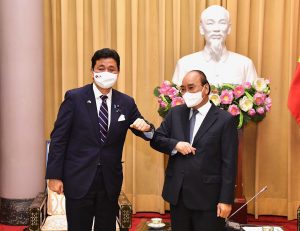Over the weekend, Japanese Defense Minister Kishi Nobuo made a visit to Vietnam as part of his first overseas trip since assuming the post last year. Apart from advances on individual deliverables, both sides also signaled the gradual evolution of their defense ties to a more regionalized vision, a trend with implications not only for bilateral ties but the Indo-Pacific more generally.
Japan-Vietnam defense relations have seen their fair share of advances in recent years. Apart from shared concerns in areas ranging from the cyber domain to aspects of China’s behavior, this is aligned with the broader objectives of both countries, with Vietnam strengthening ties with a range of powers as part of its omnidirectional foreign policy and Japan boosting ties with Southeast Asian countries and ASEAN as a whole as part of its own Indo-Pacific vision. That has continued over the past few months, headlined by Prime Minister Suga Yoshihide’s visit to Vietnam last October.
Seen from that perspective, Kishi’s visit constituted the latest in a series of efforts by both sides to boost the defense aspect of their relationship. Symbolically, Kishi’s selection of Vietnam as the destination of his first overseas visit since assuming his post holds significance in and of itself. It is the latest in a series of related developments, including Suga’s Vietnam visit, also part of his first official trip outside of Japan as prime minister – that spotlights Japan’s increasing attention to Southeast Asia in general and Vietnam in particular.
Substantively, beyond individual deliverables, Kishi also clearly articulated a vision of a more regionalized Japan-Vietnam defense relationship. As per Japan’s defense ministry, during his consultations with his Vietnamese counterpart Phan Van Giang, both ministers took the opportunity to “redefine” defense collaboration under a “new level” cooperative relationship where cooperation would be “not just for cooperation for Japan and Vietnam” but also for “more proactively contributing to the peace and stability of the region and the international community.”
While the exact parameters of that “new level” were not explicitly defined, some of the items prioritized for advancement provided an indication of this. The ministry noted in its statement that in recognition of the fact that cooperation had reached this level, both sides had discussed ways in which it should evolve. The development that captured the most headlines was the signing of the Japan-Vietnam Defense Equipment and Technology Transfer Agreement. The pact, which was also a point of focus during Suga’s visit to Vietnam last year, is expected to accelerate consultations for the transfer of specific equipment including vessels, coming after Tokyo’s similar agreements being advanced with Southeast Asian countries such as the Philippines and Indonesia.
Yet defense equipment transfers were only part of the agenda for a more regionalized Japan-Vietnam defense partnership. In terms of functional areas of cooperation, for instance, both sides also specified a commitment to promote coordination towards the signing of memorandums in military medicine and cybersecurity. The latter is especially notable given Japan’s efforts to advance cyber security training within ASEAN as a grouping, which it has made a highlight of its signature defense approach to ASEAN known as the Vientiane Vision.
With respect to regional architecture, the consultations between both sides also made reference to the connectivity between Japan’s Free and Open Indo-Pacific (FOIP) and the ASEAN Outlook on the Indo-Pacific (AOIP). While this is consistent with how the Indo-Pacific has been referenced in Japan-Vietnam interactions to date, the continued emphasis bears significance given some of the internal conversations within ASEAN as a grouping, including attention to some of the security-oriented aspects of AOIP within forums such as the ASEAN Defense Ministers’ Meeting.
To be sure, advancing an increasingly regionalized Japan-Vietnam agenda will not be without its challenges. Both sides will have to manage their own mix of regional and domestic challenges, with issues ranging from North Korea to Myanmar amid a pandemic and political transitions, with Japan in particular moving towards a round of elections that will once again spotlight its management of post-Abe politics. China also looms large even as both sides pursue greater collaboration, and China’s Foreign Minister Wang Yi was in fact in Vietnam during Kishi’s visit, where he delivered a pointed message on managing the South China Sea disputes.
Nonetheless, a more regionalized Japan-Vietnam defense partnership is not without significance considering the heft of both countries amid wider regional and global trends and developments. As such, how both sides look to realize the vision they have outlined recently will be notable to watch, with implications not just for the two countries but also the wider Indo-Pacific region.

































